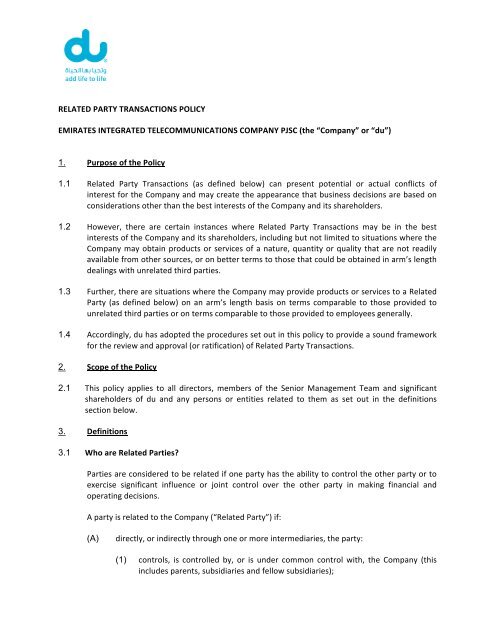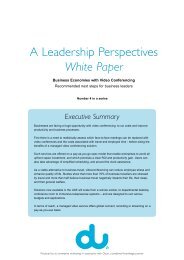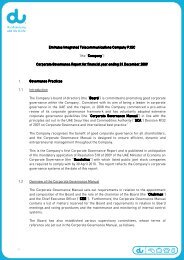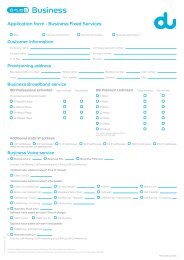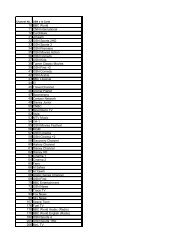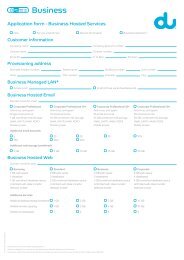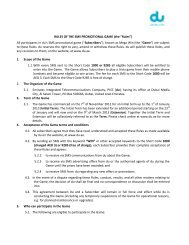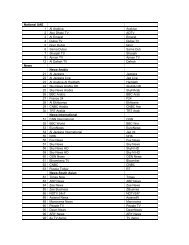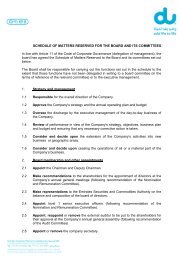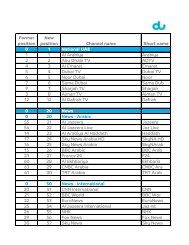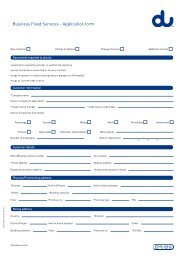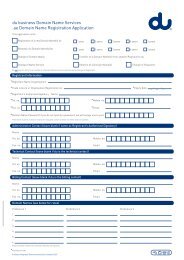RELATED PARTY TRANSACTIONS POLICY EMIRATES ... - Du
RELATED PARTY TRANSACTIONS POLICY EMIRATES ... - Du
RELATED PARTY TRANSACTIONS POLICY EMIRATES ... - Du
You also want an ePaper? Increase the reach of your titles
YUMPU automatically turns print PDFs into web optimized ePapers that Google loves.
<strong>RELATED</strong> <strong>PARTY</strong> <strong>TRANSACTIONS</strong> <strong>POLICY</strong> <br />
<strong>EMIRATES</strong> INTEGRATED TELECOMMUNICATIONS COMPANY PJSC (the “Company” or “du”) <br />
<br />
1. Purpose of the Policy <br />
1.1 Related Party Transactions (as defined below) can present potential or actual conflicts of <br />
interest for the Company and may create the appearance that business decisions are based on <br />
considerations other than the best interests of the Company and its shareholders. <br />
1.2 However, there are certain instances where Related Party Transactions may be in the best <br />
interests of the Company and its shareholders, including but not limited to situations where the <br />
Company may obtain products or services of a nature, quantity or quality that are not readily <br />
available from other sources, or on better terms to those that could be obtained in arm’s length <br />
dealings with unrelated third parties. <br />
1.3 Further, there are situations where the Company may provide products or services to a Related <br />
Party (as defined below) on an arm’s length basis on terms comparable to those provided to <br />
unrelated third parties or on terms comparable to those provided to employees generally. <br />
1.4 Accordingly, du has adopted the procedures set out in this policy to provide a sound framework <br />
for the review and approval (or ratification) of Related Party Transactions. <br />
2. Scope of the Policy <br />
2.1 This policy applies to all directors, members of the Senior Management Team and significant <br />
shareholders of du and any persons or entities related to them as set out in the definitions <br />
section below. <br />
3. Definitions <br />
3.1 Who are Related Parties <br />
Parties are considered to be related if one party has the ability to control the other party or to <br />
exercise significant influence or joint control over the other party in making financial and <br />
operating decisions. <br />
A party is related to the Company (“Related Party”) if: <br />
(A)<br />
directly, or indirectly through one or more intermediaries, the party: <br />
(1) controls, is controlled by, or is under common control with, the Company (this <br />
includes parents, subsidiaries and fellow subsidiaries);
(2) has an interest in the Company that gives it significant influence over the <br />
Company; or <br />
(3) has joint control of the Company; <br />
(B)<br />
(C)<br />
(D)<br />
(E)<br />
(F)<br />
(G)<br />
the party is an associate of the Company, where an associate is an enterprise in which <br />
the Company has significant influence but not control or joint control; <br />
the party is a joint venture and the Company has joint control of the joint venture; <br />
the party is a member of the key management personnel of the entity or its parent; <br />
the party is a close member of the family of any individual referred to in (A) or (D), <br />
where a close member of the family includes, but is not limited to, the individual’s <br />
spouse and children, the children of the individual’s spouse and dependants of the <br />
individual or the individual’s spouse; <br />
the party is an entity that is controlled, jointly controlled or significantly influenced by, <br />
or for which significant voting power in such entity resides with, directly or indirectly, <br />
any individual referred to in (D) or (E); or <br />
the party is a post‐employment benefit plan for the benefit of employees of the <br />
Company, or of any entity that is a Related Party of the Company. <br />
3.2 What is a Related Party Transaction <br />
A Related Party Transaction is a transfer of resources, services or obligations between the <br />
Company and a Related Party, regardless of whether a price is charged. <br />
3.3 What is a Material Related Party Transaction <br />
A Material Related Party Transaction is a Related Party Transaction determined by the Audit <br />
Committee to be potentially or actually significant to du. <br />
4. What are the approval procedures <br />
4.1 The Board of Directors has determined that the Audit Committee (the “Committee”) is best <br />
suited to determine whether Related Party Transactions are Material Related Party Transactions <br />
and to approve or disapprove any non‐Material Related Party Transactions. <br />
Approvals prior to the beginning of the financial year
4.2 At the beginning of each financial year the Chief Executive Officer or the Chief Financial Officer <br />
shall recommend and refer to the Committee the Related Party Transactions that the executive <br />
management proposes should be entered into by the Company for that financial year, including <br />
the proposed aggregate value of such transactions, if applicable. <br />
4.3 The Chief Executive Officer or the Chief Financial Officer shall ensure that the Committee <br />
receives all documents and other relevant facts and figures that would enable the Committee to <br />
reach an informed decision in respect of any proposed Related Party Transaction. <br />
4.4 After review, the Committee shall: <br />
(A)<br />
(B)<br />
refer to the board each Related Party Transaction that the Committee determines is a <br />
Material Related Party Transaction, along with a recommendation of whether to <br />
approve or disapprove such Material Related Party Transaction; and <br />
approve or disapprove each other Related Party Transaction. <br />
4.5 The board shall review and either approve or disapprove each Material Related Party <br />
Transaction that is referred to it by the Committee. <br />
4.6 At each subsequently scheduled meeting of the Committee, the Chief Executive Officer or the <br />
Chief Financial Officer shall update the Committee as to any material change in any Related <br />
Party Transaction that has been previously approved by the Committee or the Board. <br />
4.7 The executive management must also refer to the Committee any Related Party Transactions <br />
preliminarily entered into by the executive management prior to the beginning of the financial <br />
year subject to ratification by the Committee or the board, as applicable. If a Related Party <br />
Transaction is not ratified, the executive management shall take such steps as are reasonable to <br />
cancel or annul the transaction. <br />
4.8 If it is not practicable or advisable to wait until the next scheduled Committee meeting, the <br />
Chairman of the Committee may use his discretion to allow the Chief Executive Officer or the <br />
Chief Financial Officer to obtain the Committee’s approval (or disapproval ) by circulation. <br />
Approvals during the financial year <br />
4.9 If the executive management proposes that the Company enters into any further Related Party <br />
Transactions subsequent to the first meeting of the Committee in the financial year, the Chief <br />
Executive Officer or the Chief Financial Officer shall, as soon as reasonably practicable, refer <br />
such transactions to the Committee including the proposed aggregate value of such transactions, <br />
if applicable.
4.10 The Chief Executive Officer or the Chief Financial Officer shall ensure that the Committee <br />
receives all documents and other relevant facts and figures that would enable the Committee to <br />
reach an informed decision in respect of any proposed Related Party Transaction. <br />
4.11 After review, the Committee shall: <br />
(A)<br />
(B)<br />
refer to the board each Related Party Transaction that the Committee determines is a <br />
Material Related Party Transaction, along with a recommendation of whether to <br />
approve or disapprove such Material Related Party Transaction; and <br />
approve or disapprove each other Related Party Transaction. <br />
4.12 The board shall review and either approve or disapprove each Material Related Party <br />
Transaction that is referred to it by the Committee. <br />
4.13 At each subsequently scheduled meeting of the Committee, the Chief Executive Officer or the <br />
Chief Financial Officer shall update the Committee as to any material change in any Related <br />
Party Transaction that has been previously approved by the Committee or the Board. <br />
4.14 The executive management must also refer to the Committee any Related Party Transactions <br />
preliminarily entered into by management subject to ratification by the Committee or the board, <br />
as applicable. If a Related Party Transaction is not ratified, the executive management shall take <br />
such steps as are reasonable to cancel or annul the transaction. <br />
4.15 If it is not practicable or advisable to wait until the next scheduled Committee meeting, the <br />
Chairman of the Committee may use his discretion to allow the Chief Executive Officer or the <br />
Chief Financial Officer to obtain the Committee’s approval (or disapproval) by circulation. <br />
Interested directors <br />
4.16 A director who is in any way interested in a contract or proposed contract with the Company <br />
shall declare the nature of his interest at a meeting of the directors in accordance with Article <br />
29(4) of the Company’s articles of association. <br />
4.17 A director so interested shall not participate in any review, consideration or approval of the <br />
Related Party Transaction in question. <br />
5. Considerations to be taken into account when reviewing a Related Party Transaction <br />
5.1 The Committee shall consider all of the relevant facts and circumstances available to the <br />
Committee including, but not limited to: <br />
(A)<br />
the benefits to du of entering into the transaction;
(B)<br />
(C)<br />
(D)<br />
(E)<br />
(F)<br />
the extent of the Related Party’s interest; <br />
the availability of other sources of comparable products or services; <br />
the extent to which the terms of the Related Party Transaction are less favourable than <br />
terms generally available in non‐related transactions under like circumstances; <br />
the value (aggregated if possible) of the Related Party Transaction; and <br />
the impact on a director’s independence if the Related Person is a director, an <br />
immediate family member of a director or an entity in which a director is a shareholder <br />
or of which a director is a senior executive officer, director, general partner, managing <br />
member or a person in a similar position. <br />
6. Approval of Related Party Transactions <br />
6.1 The Committee (acting in good faith) shall approve only those Related Party Transactions that <br />
are in, or are not inconsistent with, the best interests of du and its shareholders. <br />
6.2 The approval shall be by simple majority of the votes of those members of the Committee <br />
present in person or by proxy. <br />
6.3 The Chairman of the Committee shall report, in writing, to the board of directors the approvals <br />
granted in respect of each Related Party Transaction. <br />
6.4 The Committee’s written report should cover: <br />
(A)<br />
(B)<br />
(C)<br />
(D)<br />
(E)<br />
whether the terms of the transactions are fair to du and the extent to which the <br />
transaction is beneficial to du; <br />
whether the transaction is material to du; <br />
the role that the Related Party has played in arranging the transaction; <br />
the structure of the transaction; and <br />
the interests of all Related Parties in the transaction. <br />
7. Ratification procedure <br />
7.1 If du’s Chief Executive Officer or Chief Financial Officer become aware of a Related Party <br />
Transaction that has not been previously approved or ratified by the Committee in accordance <br />
with this policy, the Chief Executive Officer or the Chief Financial Officer (as appropriate) shall <br />
inform the Committee promptly of the details of that transaction.
7.2 The Committee shall consider all of the relevant facts and circumstances available to it. The <br />
Committee shall evaluate all options open to the Company, including but not limited to <br />
ratification, amendment or termination of the Related Party Transaction. <br />
8. Disclosure <br />
8.1 The Committee shall ensure that each Related Party Transaction is reported properly in the <br />
Company’s financial statements in accordance with the applicable international accounting <br />
standards. <br />
8.2 The Company Secretary shall use his best endeavours to comply with any requests for disclosure <br />
made by the Emirates Securities and Commodities Authority (“ESCA”) in respect of a particular <br />
Related Party Transaction. <br />
9. Amendments to the policy <br />
The Committee shall review this Related Party Transactions policy at least annually and, if <br />
considered appropriate, propose amendments to the board of directors. <br />
10. Breach of this policy <br />
Breaches of this policy by a director or a member of the Senior Management Group will be dealt <br />
with under du's disciplinary procedures. <br />
11. Applicable regulatory framework <br />
11.1 This policy reflects the following laws and regulations as well as du's practice. <br />
(A)<br />
(B)<br />
(C)<br />
Code of Corporate Governance (Ministerial Decision No (518) of 2009 concerning <br />
Governance Rules and Corporate Discipline Standards); <br />
Commercial Companies Law No 8 of 1984 (as amended); and <br />
The Company’s Articles of Association. <br />
11.2 The Audit Committee will be responsible for reviewing this policy at least annually. <br />
11.3 Extracts from the relevant provisions of the above laws and regulations are set out in Appendix 1.
Commercial Companies Law <br />
Appendix 1 <br />
Related Party Transactions Regulatory Framework <br />
Article 109: “Any board member having a conflict of interest with that of the company in respect of <br />
certain transactions presented to the board for consideration and approval, should report such conflict <br />
to the board. Such reporting of conflicts should be noted in the minutes of the relevant board meeting <br />
and the board member with the conflict of interest shall not participate in the voting on the decision <br />
concerning the said transaction.” <br />
du’s Articles of Association <br />
Article 29(4): “Any member of the board of directors who has a personal interest in any business or <br />
matter presented to the Board for discussions or approval must disclose such interest to the Board and <br />
this must be recorded in the minutes. Such member may not vote on the resolution pertaining to the <br />
relevant business or matter.” <br />
ESCA Corporate Governance Regulations <br />
Article 3(10): “if a major shareholder or a director has any conflict of interests with any matter to be <br />
considered by the board of directors and the board of directors determines that such a matter is <br />
significant, the decision relating to such matter must be made in the presence of the majority directors <br />
provided that the interested directors will not be allowed to cast their votes. In exceptional <br />
circumstances, such matters may be dealt with by ad‐hoc committees for the purpose of looking into <br />
those matters and the committee’s opinion shall be referred to the board of directors to make a <br />
decision in this regard”. <br />
International Accounting Standards <br />
Article 24 of the International Accounting Standard (the ”IAS”) requires that an entity's financial <br />
statements should contain the disclosures necessary to draw attention to the possibility that its financial <br />
position and profit or loss may have been affected by the existence of related parties and by <br />
transactions and outstanding balances with such parties.


